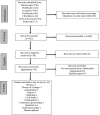Stakeholder engagement in healthcare research in India - A systematic review
- PMID: 40375276
- PMCID: PMC12080155
- DOI: 10.1186/s12961-025-01341-9
Stakeholder engagement in healthcare research in India - A systematic review
Abstract
Background: Stakeholder engagement is increasingly crucial in healthcare research, particularly in diverse and complex settings such as India. Stakeholder engagement in health research is about collaborating with key parties such as patients, healthcare providers and policymakers to ensure the research is relevant and impactful by addressing real-world needs, thereby enhancing its quality and effect on healthcare practices.
Aim: The purpose of this study was to summarize the evidence on stakeholder engagement in healthcare research and its influence on research outcomes and healthcare policies in India.
Methods: The evaluation was conducted following the Preferred Reporting Items for Systematic Reviews and Meta-Analyses guidelines. A systematic search was conducted in PubMed, SCOPUS, ProQuest, EMBASE, Web of Science, CINAHL Indian Citation Index and J-Gate, focussing on stakeholder involvement in healthcare settings in hospitals and communities in India. Various research methodologies were employed, with studies not centred on healthcare stakeholder engagement or unrelated sectors being excluded. Tools such as the Critical Appraisal Skills Programme checklist for qualitative studies and the mixed methods appraisal tool were used to evaluate the quality of the studies. Data synthesis was carried out using the descriptive/narrative synthesis approach.
Results: We included 25 articles on the basis of our eligibility criteria. These articles comprised reviews, theories of change, quantitative studies, reports, mapping, commentaries, conference proceedings, qualitative studies, experience papers and mixed methods research. The review examined different types and methods of engaging stakeholders in healthcare research projects, evaluated their influence on evidence-based practice, and investigated their relevance to reaching "hard-to-reach" populations. Overcoming financial, time, knowledge and logistical barriers and gaining support from international and governmental bodies can lead to more inclusive research with a significant impact.
Conclusions: Findings suggest that stakeholder engagement contributes to more contextually relevant and ethically grounded research, though challenges related to power dynamics, resource allocation and inclusivity remain prevalent. The review concludes by providing recommendations for enhancing stakeholder engagement practices in future healthcare research in India, emphasizing the need for capacity-building and inclusive frameworks that ensure diverse voices are represented.
Keywords: Approaches; Child health; Engagement; Health equity; Healthcare; India; Mental health; Preventable diseases; Primary health nursing; Public health; Reproductive health; Research; Stakeholder; Universal health coverage.
© 2025. The Author(s).
Conflict of interest statement
Declarations. Ethics approval and consent to participate: Not applicable. Consent for publication: Not applicable. Competing interests: The authors declare no competing interests.
Figures
Similar articles
-
Beyond the black stump: rapid reviews of health research issues affecting regional, rural and remote Australia.Med J Aust. 2020 Dec;213 Suppl 11:S3-S32.e1. doi: 10.5694/mja2.50881. Med J Aust. 2020. PMID: 33314144
-
Folic acid supplementation and malaria susceptibility and severity among people taking antifolate antimalarial drugs in endemic areas.Cochrane Database Syst Rev. 2022 Feb 1;2(2022):CD014217. doi: 10.1002/14651858.CD014217. Cochrane Database Syst Rev. 2022. PMID: 36321557 Free PMC article.
-
The future of Cochrane Neonatal.Early Hum Dev. 2020 Nov;150:105191. doi: 10.1016/j.earlhumdev.2020.105191. Epub 2020 Sep 12. Early Hum Dev. 2020. PMID: 33036834
-
PROTOCOL: Barriers and facilitators to stakeholder engagement in health guideline development: A qualitative evidence synthesis.Campbell Syst Rev. 2022 Apr 25;18(2):e1237. doi: 10.1002/cl2.1237. eCollection 2022 Jun. Campbell Syst Rev. 2022. PMID: 36911345 Free PMC article.
-
Impact of summer programmes on the outcomes of disadvantaged or 'at risk' young people: A systematic review.Campbell Syst Rev. 2024 Jun 13;20(2):e1406. doi: 10.1002/cl2.1406. eCollection 2024 Jun. Campbell Syst Rev. 2024. PMID: 38873396 Free PMC article. Review.
References
-
- Sterling EJ, Betley E, Sigouin A, Gomez A, Toomey A, Cullman G, et al. Assessing the evidence for stakeholder engagement in biodiversity conservation. Biol Conserv. 2017;1(209):159–71.
-
- Chandwani R. Stakeholders in the Indian healthcare sector. Vikalpa The J Decision Makers. 2021;46(2):65–70. 10.1177/02560909211030356.
Publication types
MeSH terms
LinkOut - more resources
Full Text Sources
Medical





